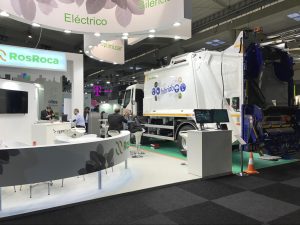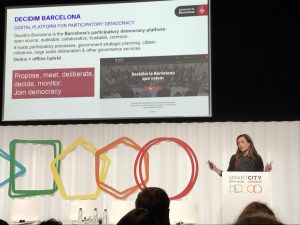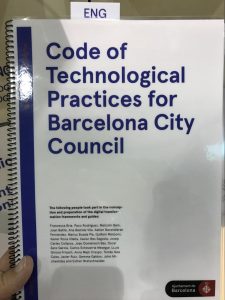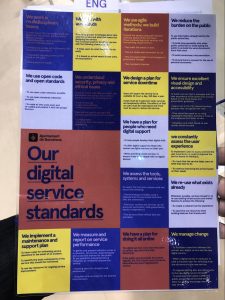Insights from Perform Green’s team at Smart City Expo World Congress 2017, words from Gavin Beckett
At first impressions Smart City Expo World Congress 2017 is a technological assault on the senses – with an enormous Expo area full of city infrastructure ranging from smart vehicles to data visualisations. Many vendors attending are looking to sell their technology solutions and many cities and countries are seeking partners to invest in their smart city infrastructure.


Creating a People Centric Programme
However, it doesn’t take much effort to sense a strong current of people centric, bottom up, participatory city philosophy that has been woven into the programme – partly through the influence of people like Mara Balestrini joining the programme committee.
On panels like –
- “Collective efforts to tackle global urban challenges”
- “Beyond the Smart City: Democratizing innovation while putting citizens first”
- and “Digital Fabrication: Transforming Citizens from Consumers to Producers”
Speakers from across the world talked about the ways in which they were refocusing on the people in the city, fostering what Perform Green are calling “smart society”. We also heard inspirational talks from people like Jason Burton and Beth Simone Noveck who shared their experiences of creating the Better Block organisation and bringing people into governance and policy processes through CrowdLaw.
There is amazing work going on in so many places, but to keep this post from becoming a novel I’m going to focus on Barcelona – in part because of the link between it and my home city of Bristol, where we launched the “Bristol approach to citizen sensing” a couple of years ago – shaped by Knowle West Media Centre and Mara Balestrini’s “innovation with impact” consultancy Ideas for Change. It was this project, alongside the delivery of Bristol’s Smart City Operations Centre, which contributed to Bristol taking the top spot in the Huawei Smart City Index 2017.
The Barcelona Philosophy
In Barcelona, under the political leadership of Mayor Ada Colau, with Francesca Bria as Chief Technology & Digital Innovation Officer, this approach has been taken to a new level, within a comprehensive framework that’s both conceptual and practical. Francesca introduced their approach with the stirring phrase –
“There is no digital revolution without democratic revolution”

In my last post on Smart Cities I used the phrases “top down” and “bottom up” to contrast city/tech vendor led projects with citizen led work, and many other people at the Smart City World Congress used this language. But Francesca Bria took a different approach, saying:
“We want to move away from a top down / bottom up dichotomy… usually you frame it as top down is government, bottom up is people – how about creating a synergistic way, where the government is transformed by the people… meaning that you integrate the top down and bottom up, in a way that you really give and empower the citizens into taking political decisions”
Barcelona have realised this philosophy through their adoption of deep participatory processes, and implemented the digital technology to support them in the form of “Decidim Barcelona”

Decidim is far more than an open source version of the e-petitions and consultation products that UK councils are used to. The project/platform encompasses design, training courses, legal frameworks, user and facilitation communities amongst other things. It goes beyond consultation to support participatory democracy, helping communities self-organise, to co-produce strategic planning, run participatory budgeting, and implement distributed decision making.
Bria strongly articulated the council’s vision for this technology enabled response to the crisis of democracy that so many countries and regions are facing – declining voter turnout, high dissatisfaction with the system, and an increase in populism and right-wing nationalist movements that encourage a turn to focus inwards and blame ‘the other’.
In this context, an insistence on starting with the citizen and social needs isn’t a negative, anti-vendor choice. It’s a profoundly democratic and humanist approach aimed at the good of all who live, work and do business in the city. And projects like Decidim aren’t isolated pilots, they sit in a city government wide policy framework, that includes a technology code of practice, a commitment to open standards, open source and innovative procurement practices.
I spoke briefly to Francesca Bria – she was in demand! – and asked her if Barcelona had been inspired by and borrowed from GDS in the U.K. She agreed that they had looked to the way GDS set out their principles, technology code of practice and the digital service standard, but had then adapted them to fit the context of Barcelona as a city, rather than a national government agency. Colleagues in LocalGov Digital will recognise this as similar to the Local Government Digital Service Standard that we created and adopted in recent years.
They aren’t afraid to tackle seriously complex technical and social problems either. The Bristol Approach included the concept of a “data commons” – where the value of data generated by individuals and communities isn’t appropriated by corporations or the state but is retained for ongoing use and benefit of the people. But for various reasons the project didn’t manage to implement this concept fully. Now Barcelona, along with Amsterdam and a number of other partners, is in the first year of a major project to create the technology platform needed to ensure “data sovereignty” is respected and implemented securely.
The Decode Project
The Decode project is building on blockchain technology, but extending it to be “privacy aware” and making it possible to provide “zero knowledge proofs” – a bit like the concept of attribute exchange that’s been talked about in relation to GOV.UK Verify – the ability to assert that an individual has a characteristic that makes them eligible to do something (vote, request a service) without actually revealing what that characteristic is.

Decode has only just started, and the next year will see prototypes developed, piloted and a programme of engagement and community building.
A similar approach is being taken to the traditional smart city use cases of connecting sensors, data and operations centre visualisation systems – using Sentilo, an open standards, open source platform.

So the Barcelona Smart City story certainly incorporates serious high tech. But it does so firmly in the service of the people who are served by the city, and does so by creating “Privacy protecting, rights respecting, data services” as Francesca called them.
Be a Shaper & Maker of Technology
In his summing up of the panel “Beyond the Smart City: Democratising Innovation while putting citizens first”, Geoff Mulgan of Nesta commented that ten years ago cities were “takers of technology” (choosing to buy or not buy), but now they are “shapers and makers of technology”. To be successful, cities need new capabilities – they need entrepreneurs within the organisation, new forms of governance, to invest in multi-disciplinary cross-council teams, and to take procurement, technology staff, managers, and senior officials through an agile digital transformation.
How Can UK Cities Tackle this Challenge?
This sounds hard, and in these times of public sector austerity many senior leaders are seeing their organisations through purely financial or accountancy lenses… so how can UK cities tackle this challenge? To paraphrase the message from Turin’s Paola Pisano and Francesca Bria:
“We have to build new coalitions, link between cities, to collaborate on creating the future we want to live in.”
This mission resonates strongly with the idea of a “coalition of the willing and able” that Andrew Collinge and Theo Blackwell both spoke of at Smart City Expo, in relation to encouraging collaboration amongst the 33 London Boroughs within the Greater London Authority’s strategic scope – which is also relevant to the whole of the UK’s local authority landscape. All of us working in the public sector and in organisations dedicated to improving public service should be willing to work together to find better ways to support the growth of more engaged participatory democracy – so if you are able, seek out these coalitions and get involved.
At Perform Green we are connected to many councils and often see common problems, challenges and solutions that can be applied with the right knowledge and expertise. If you would like to discuss your challenges and how our team of experts could support your smart society development, saving money and driving innovation in services, then contact Lara Moloney on lara.moloney@performgreen.co.uk to set up a time to tell us more.
Read more from Gavin’s Thought Leadership series
Creating a model for Local Government as a Platform
From Smart Cities to Smart Societies — The Story so Far
Can We Still Talk about Digital Transformation?
In other news:


